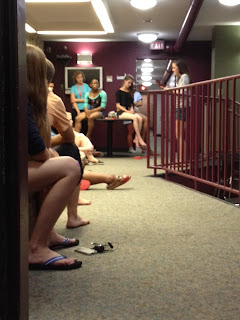Class began with a lecture about the social
construction of gender and how it is pervasive within our society. The title of
the lecture was called, “No History, No Self; Know History, Know Self.” The
lecture described how gender roles are shaped by institutions and how they
affect humanity as a whole. Gender is legitimated by religion, law, and science,
so it is difficult to resist the preconceived gender expectations.
Dean
Almandrez gave us two options for class, we could either follow the usual
schedule or we could watch "Miss Representation" in the afternoon session
instead of watching it after class. The class decided to do the latter because
we wanted more time to work on our Action Plans.
 |
| Our new classroom |
"Miss Representation" was one of the best
documentaries that I have seen! The movie opened my eyes as to how the media
portrays women. The documentary gathered a plethora of evidence and examples
and combined it into this one documentary. On a day-to-day basis, we hear discriminatory
remarks about women or we see offensive portrayals. However, we do not
acknowledge these negative portrayals due to their sporadic presence. The
documentary made it clear and obvious that women are negatively portrayed in
the media with the use of clips from broadcastings, videogames, and news
articles. Women are objectified through the media; as a result, they believe
that their voice is not significant. The objectification of women in media was
displayed in a video game in which a male character brutally killed a female
character. A person consumes ten hours and forty-five minutes of subliminal
messages through the media. It is almost as if one must live under a rock in
order to prevent oneself from being affected by the social construction of
gender
When women gain more power, discrimination
accompanies their success. More emphasis is allocated to a woman’s appearance
rather than what she has done. The documentary combined a series of short clips
of men mocking the appearances of successful women such as Hilary Clinton,
Nancy Pelosi, and Sarah Palin. Fifty-one percent of the population in the
United States is composed of women, but only seventeen percent of women hold
congressional positions.
The portrayal of women also has a negative effect
among the female gender because they are expected to reach this unattainable
idea of beauty. This is partially proven by the fact that sixty-five percent of
women and girls have eating disorders.
The
documentary inspired me to do everything I can to implement a successful action
plan. I want to be able to be a good leader despite the implication that women
should not attain such roles.
It is important to remember, however, that not
everyone conforms to society’s expectations. When overcoming an obstacle it is
best to turn to anyone is willing to help, female or male. A male staff member observed our
class and said that some men may be a part of the problem, but they may also be
a part of the solution.
After watching the documentary, it has never been
clearer as to how significant it is for us to excel at what we do. We have to
overcome the burden of social expectations and we need to be whoever we want to
be without the acknowledgement of the social implications.
I wanted to attend a tie dye event but I decided to
not go because I needed to start on my homework and to finish things up for the
Ivy League Connection. I also decided to not go to the talent show. I was a bit
disappointed that I did not go because it was the last big event Summer@Brown
would hold. My homework, however, is my
biggest priority. After I took a shower, I decided to go down to the lobby to
work on my blog. To my sweet surprise another talent show was occurring there.
The auditorium, where the talent show was held ,was at full capacity. I was able to watch the talent show for a
moment and then work on my homework. My night ended on a great note!
 |
| The talent show in the lobby of the dormitory |

No comments:
Post a Comment